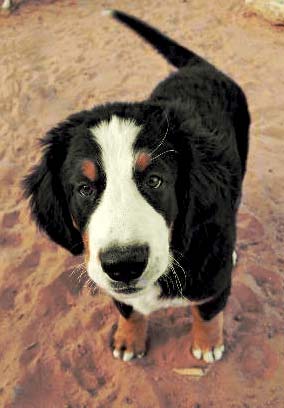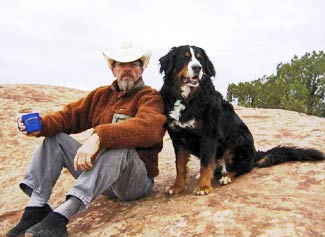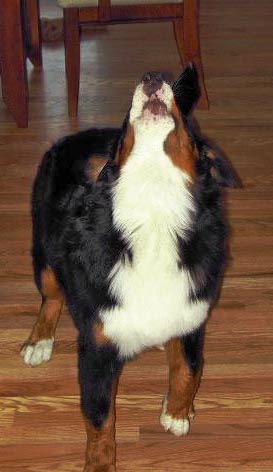Recognizing and Meeting Dogs' Need to Serve
Ruth Reynolds
November 2008
 Our dogs are in our lives to teach us, delight us, entertain us and, in my home, to serve us. The latter is often the most elusive concept for many dog owners to grasp. Folks don't want to think of dogs as objects of servitude. Unfortunately, as a result, some dogs are not afforded their rightful partnership in a family.
Our dogs are in our lives to teach us, delight us, entertain us and, in my home, to serve us. The latter is often the most elusive concept for many dog owners to grasp. Folks don't want to think of dogs as objects of servitude. Unfortunately, as a result, some dogs are not afforded their rightful partnership in a family.
In my search for a method or means of training and understanding canine behavior that fits ALL dogs in ALL situations I became acquainted with Dr. William Meisterfeld. In his development of The Philosophy of Psychological Dog Training, (PPDT) William Meisterfeld discovered that dogs possess:
-
- Will to Power -- innate drive to facilitate survival
- Base Nature -- predisposition to some sort of work or interest
- Will to Serve -- innate drive to serve another species, human
In the practice of PPDT, both submission under threat and aggression exercise and strengthen Will to Power. A cowering, timid dog is facilitating its survival and exercising its Will to Power as is a dog towering over or attacking a perceived threatening individual.
Base Nature is the dog's predisposition to do some sort of work or interest. Herding dogs herd. Pointing dogs point. Dachshunds dig etc. albeit sometimes only under the covers on the bed.
Will to Serve, the unique trait found in nearly all dogs, is an innate drive to serve another species, human. There is the occasional horse, pig, cat, monkey who saves its master's life. But the stories of dogs' devotion to humankind in this fashion are abundant.
When we accept that all dogs possess Will to Power and Will to Serve and we address dogs' need to serve by giving them ample recurring opportunities to do so, disharmony in relationships with dogs shifts to harmony. When we incorporate use of a dog's innate Base Nature, the results are most rewarding for trainer and dog.
Simple Jobs for Dogs
Dogs serve humankind in many ways. Defining a job description for their dog is challenging for many owners. Nevertheless, dogs need to understand their job description in order to do it well.
Bored, naughty, and sometimes even neurotic dogs, transform into satisfied companions of proud owners when a well defined, practiced and rewarded role of helpmate is:
· clearly defined by the owner
· within the dog's mental and physical capabilities
· clearly understood by the dog through training with mutual respect
On my farm and in my home, my animals are engaged for a few moments of undivided attention when I'm with them. They each know a trick or two and are asked to show me what they know. Acknowledging them in this way develops and continues our relationship of mutual respect and communication. It develops their servitude in a way they love--- one -on-one attention and reward.
 Their "work" primarily consists of two jobs. The first is, facilitating the ease of my work by being with me in the right place at the right time so as to not impede my progression through my day's activities. The second is, using their enhanced senses to detect changes in our environment and alerting me to them through letting me know of comings and goings of others and perceived dangers. In exchange I attend to their need as individuals to be acknowledged as unique, special, and smart for jobs well done. There is no need for incessant behavior because their job well done is acknowledged.
Their "work" primarily consists of two jobs. The first is, facilitating the ease of my work by being with me in the right place at the right time so as to not impede my progression through my day's activities. The second is, using their enhanced senses to detect changes in our environment and alerting me to them through letting me know of comings and goings of others and perceived dangers. In exchange I attend to their need as individuals to be acknowledged as unique, special, and smart for jobs well done. There is no need for incessant behavior because their job well done is acknowledged.
In general a respectful animal is that way because he/she has been rewarded for desired behavior. Likely he/she has also behaved in an unacceptable way a time or two and has been shown a different way to behave that brings about better rewards. When we allow a dog to be rude repeatedly, we assure the dog its privilege to be mindlessly disrespectful. When we don't teach the dog and reward him/her for desired behaviors, we find ourselves repeatedly "correcting" or "pointing out" misbehavior, neither of which is constructive on a repetitive basis.
One case involved Ginger and her dog, Spike, who barked excessively. Spike barked because he thought Ginger was oblivious to things going on in their surroundings to which he felt she should reacting.
-
- ......Once Ginger
-
- · realized Spike barked for a reason real to him
- · developed skill in deducing what triggered Spike's alerts
- · acknowledged to Spike she perceived what he was telling her
- · showed Spike she had things under control by attending to the matter of concern
- ............................ Spike's excessive barking diminished considerably.
 Sometimes attending to the matter of concern involved teaching Spike that something he feared need not be feared, for example, a new piece of patio furniture. Other times Spike needed reassurance that Ginger simply knew the blue jays were fighting again at the bird feeder. Part of Spike's Base Nature was to observe and alert. Once Ginger understood this, she developed a new appreciation for Spike.
Sometimes attending to the matter of concern involved teaching Spike that something he feared need not be feared, for example, a new piece of patio furniture. Other times Spike needed reassurance that Ginger simply knew the blue jays were fighting again at the bird feeder. Part of Spike's Base Nature was to observe and alert. Once Ginger understood this, she developed a new appreciation for Spike.
Another case involved my client, Maryjane, who identified several undesired behaviors in her dog, Boinky, and chose this one to change first.
Boinky chose to lay in Maryjane's pathways in their home. When I pointed out he did this so she couldn't pass by him without his knowing about it, Maryjane's reaction (ahhhhhh) clearly indicated that Boiky was getting many mixed signals from his owner. Cute AND annoying AND out of control--that was Boinky.
Maryjane taught Boinky on leash to move away from her while standing. By Maryjane's using the term "Beep beep," and then bumping into Boinky so he would move, Boinky learned to direct his attention to Maryjane and immediately move out of her way when he heard, "Beep beep." Eventually he avoided being in her way by choosing to lay nearby but not in her traffic pattern.
Developing a heightened sense of awareness of the welfare of others is something kind people do. It's something kind dogs do. Teach your dog to be kind to you by giving him the opportunity to know what he can do to facilitate the ease of your life with him. Other things to teach include: "off" which means keep four feet on the floor, "wait" and "gentle".
Consider your dog's innate need to serve. Should you choose to embrace this concept, it is likely to change your life with dogs in a very positive way.